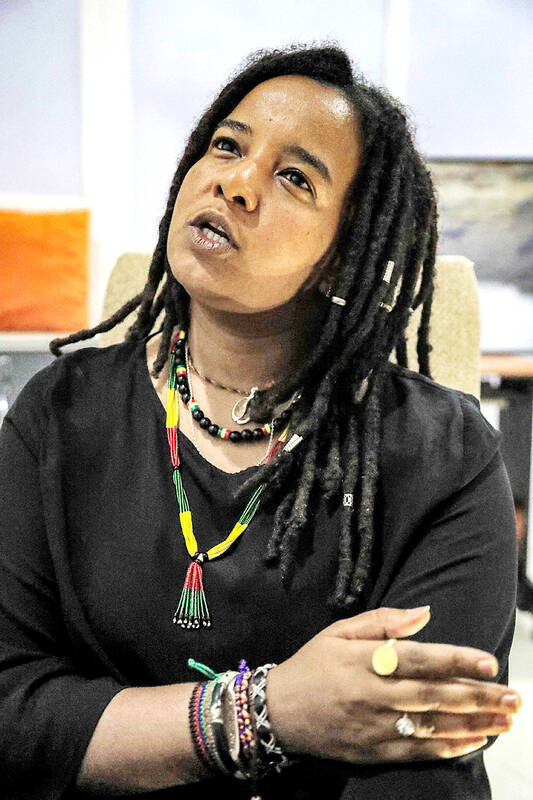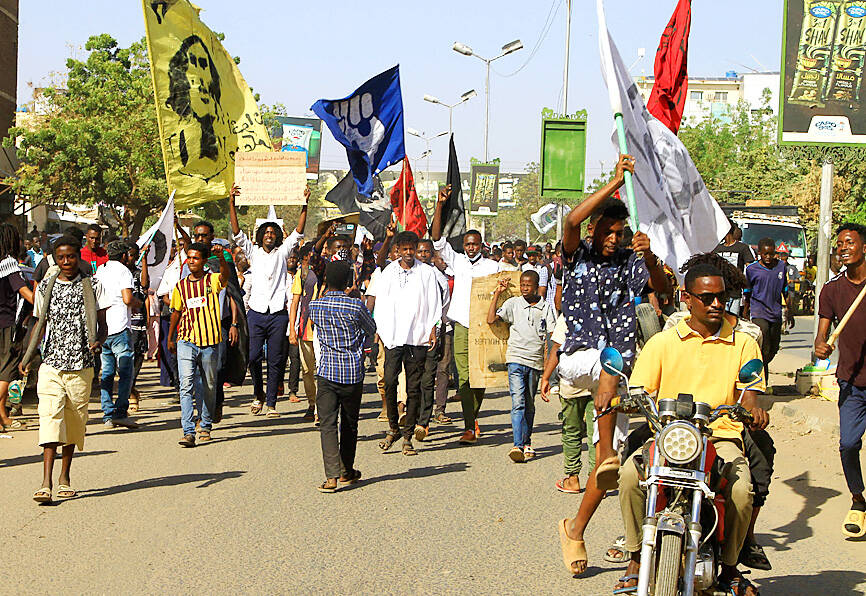With his distinctive long dreadlocks and slouchy beanie, Abdallah Ahmed has always known his choice of lifestyle means trouble in Sudan, where long-oppressed Rastafarians say they are being targeted anew.
Ahmed, 31, has for years been enamored of the Rastafari tradition, which emerged in Jamaica last century and for him represents “telling the truth, being courageous, fighting for rights.”
The number of Rastafarians in Sudan is unknown and the community had largely lived underground under the rule of former Sudanese president Omar al-Bashir, who was ousted in April 2019 following mass protests against his government.

Photo: AFP
“We were very enthused after [al-]Bashir’s fall,” said Ahmed, a long-time Bob Marley fan also known as “Maxman,” at an art exhibition where he was performing reggae music with his band.
“Musicians and artists flourished,” he said, donning brightly colored head and wrist bands.
However, a brief whiff of freedom did not last as a transition to civilian rule was upended last year when General Abdel Fattah al-Burhan, head of the Sudanese armed forces, led a coup.

Photo: AFP
Rastafarianism considers former Ethiopian emperor Haile Selassie to be its messiah, but like many followers in Sudan, Ahmed said that he saw it “not as a religion.”
“It’s a lifestyle and it’s me,” he said.
Under al-Bashir, community members were regularly harassed, had their heads shaved and faced persecution under public order laws restricting how people dress or behave in public.
Ahmed said he had been arrested for drug possession in 2017 while performing music in public and was flogged 20 times.
Followers of the Rastafari tradition have always been “easy targets” for security forces due to their looks, Ahmed said. “It however never stopped us from growing our hair.”
“Some of us died while holding on to their personal lifestyle,” he said.
The killings of several Sudanese Rastafarians in mass anti-coup demonstrations since al-Burhan’s takeover last year have given rise to a popular protest slogan “the Rasta never dies.”
Noting the “peacefulness and spontaneity” of the demonstrations, 35-year-old filmmaker Afraa Saad said that it “made us believe they were being especially targeted.”
“I believe the slogan emerged to say that their good reputation will last,” Saad said.
Being a woman, Saad said she has faced greater scrutiny than male Rastafarians, as she embraced the tradition during the height of the demonstrations against al-Bashir.
“The most persistent objection is why would a girl wear dreadlocks when there are other more acceptable hairstyles,” she said, adding that there is a “prevalent stereotype” tying dreadlocks with drug use and “unbecoming behavior.”
Saad sees her lifestyle choice as part of Sudanese women’s uphill battle against strict policing of social mores since the al-Bashir regime.
Women were at the forefront of the mass protests against his government, voicing their anger at decades of discrimination that severely restricted their role in society.
“I simply don’t heed to this,” Saad said. “This is my identity and it’s who I am.”
For some in Sudan, wearing dreadlocks, listening to reggae music or having a Rasta-like lifestyle is merely an act of defiance.
Saleh Abdalla, 26, who wears his hair in short dreadlocks, said it was his way of protesting last year’s coup.
“We are refusing all violations that take place on behalf of authorities,” he told reporters during one anti-coup demonstration in the capital, Khartoum, last month.
“I will keep the Rasta [dreadlocks] until the regime falls,” Abdalla said.

BLOODSHED: North Koreans take extreme measures to avoid being taken prisoner and sometimes execute their own forces, Ukrainian President Volodymyr Zelenskiy said Ukrainian President Volodymyr Zelenskiy on Saturday said that Russian and North Korean forces sustained heavy losses in fighting in Russia’s southern Kursk region. Ukrainian and Western assessments say that about 11,000 North Korean troops are deployed in the Kursk region, where Ukrainian forces occupy swathes of territory after staging a mass cross-border incursion in August last year. In his nightly video address, Zelenskiy quoted a report from Ukrainian Commander-in-Chief Oleksandr Syrskyi as saying that the battles had taken place near the village of Makhnovka, not far from the Ukrainian border. “In battles yesterday and today near just one village, Makhnovka,

HOLLYWOOD IN TURMOIL: Mandy Moore, Paris Hilton and Cary Elwes lost properties to the flames, while awards events planned for this week have been delayed Fires burning in and around Los Angeles have claimed the homes of numerous celebrities, including Billy Crystal, Mandy Moore and Paris Hilton, and led to sweeping disruptions of entertainment events, while at least five people have died. Three awards ceremonies planned for this weekend have been postponed. Next week’s Oscar nominations have been delayed, while tens of thousands of city residents had been displaced and were awaiting word on whether their homes survived the flames — some of them the city’s most famous denizens. More than 1,900 structures had been destroyed and the number was expected to increase. More than 130,000 people

Some things might go without saying, but just in case... Belgium’s food agency issued a public health warning as the festive season wrapped up on Tuesday: Do not eat your Christmas tree. The unusual message came after the city of Ghent, an environmentalist stronghold in the country’s East Flanders region, raised eyebrows by posting tips for recycling the conifers on the dinner table. Pointing with enthusiasm to examples from Scandinavia, the town Web site suggested needles could be stripped, blanched and dried — for use in making flavored butter, for instance. Asked what they thought of the idea, the reply

US Secretary of the Treasury Janet Yellen on Monday met virtually with Chinese Vice Premier He Lifeng (何立峰) and raised concerns about “malicious cyber activity” carried out by Chinese state-sponsored actors, the US Department of the Treasury said in a statement. The department last month reported that an unspecified number of its computers had been compromised by Chinese hackers in what it called a “major incident” following a breach at contractor BeyondTrust, which provides cybersecurity services. US Congressional aides said no date had been set yet for a requested briefing on the breach, the latest in a serious of cyberattacks